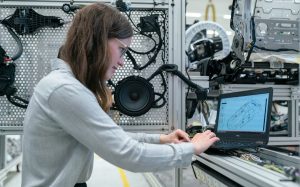MBTI Test: Free Online Myers-Briggs Type Indicator Alternative
People are switching from the MBTI test to HIGH5 test. Here’s why…
Strengths Oriented
Specifically highlight strengths, not weaknesses or themes.
Focused on Action
Gives you the tools you need to apply strengths to the real world.
Reporting for Teams
Analyzes strengths throughout teams and organizations.
Increase Teamwork
Designed to give clear insights to boost interpersonal skills.
Easy to Understand
Anyone can understand and learn from their results.
Scale to Large Teams
Spread positivity and motivation throughout your entire team.
Supported by Research
Based on decades of detailed strengths-based research.
Start Immediately
No waiting around for feedback. Only simple, actionable results.
Progress Tracking
See your personal growth over time.
Full Strengths Overview
Get an outside view of your abilities.
Strengths Academy
Take advantage of hundreds of informative and engaging strengths videos.
Affordable
You can begin for free, and upgrade whenever you feel like.
What is the MBTI (Myers-Briggs Type Indicator) test?
The Myers-Briggs Type Indicator Test (MBTI) is one of the most used psychological tools aimed for a wide range of purposes. It is a self-report inventory, i.e., a specific type of psychological test that the tester completed to reveal their own personality type. The MBTI is based on Carl Jung’s theory on psychological types [1]. Jung’s theory was later extensively studied and extended by Katharine Briggs and her daughter Isabel Myers. The basics of the MBTI lie in the belief that some seemingly random personality traits can be analyzed and grouped into specific cognitive functions that determine a person’s type. Both women created the Myers-Briggs Type Indicator, categorizing people into 16 different personality types. The categories are based on four dichotomies that focus on four cognitive functions that deliver the personality type when combined in a specific cluster [2].
The dichotomies go as follows: Introversion-Extroversion, Sensing-Intuition, Thinking-Feeling, and Judging-Perceiving. After completing the assessment, each tester will be given a 4-letter result, aligning to each of the 4 dichotomies. The names of the 16 personalities, i.e., their acronyms, are delivered based on the specific combination of these functions, such as INTJ (Introverted, Intuitive, Thinking, Judging), or ESTJ (Extroverted, Sensing, Thinking, Judging). Combining these functions delivers somebody’s personality type, i.e., they point to a person’s interaction with the outer or inner world, their preferences, strengths and weaknesses, and how people make decisions.
Why should you take the MBTI assessment?
One of the greatest perks of the MBTI test is its non-judgemental nature. It has been designed in a way that reveals a person’s strengths and weaknesses without preferring one personality type over another.. The purpose of the test is to understand and cherish personality differences.
When a person knows their personality type, it can provide an insight into their personality on a much deeper level.It can help individuals understand why they behave the way they do without creating a feeling of incompetence or judgment.
It can explain the contrasting nature of family members, it can help people build meaningful relationships, boost their strengths and work on their weaknesses. The popularity of the MBTI is immense. Due to its simplicity, it’s one of the most well-known personality tests in the world [2]. It’s most often used to help testers understand how they interact with themselves and the world around them. Moreso, it can help with personal development activities.
Compared to HIGH5
While the MBTI provides a detailed personality type, the HIGH5 Test goes a step further by identifying your unique strengths. Rather than focusing on broad personality categories, the HIGH5 Test identifies your top strengths, helping you understand your natural tendencies and skills, and helping you leverage them in personal and professional settings. Moreso, the HIGH5 Test provides actionable insights tailored to help you thrive in your career and relationships.
How Does the Personality Test Work?
The test is divided into two sections and a total of 60 questions. The first section offers questions that describe personalities on two opposite ends. The tester needs to select which statement best aligns with them [2]. The second section includes statements (e.g., I love spending time alone), and participants have to rate the level of applicability to their personality on a Likert Scale, usually from agree to disagree. Once the answers are submitted, the participant receives their results on the screen or via email. Overall, the assessment takes about 10 to 20 minutes to complete [2]. The MBTI is not a psychological diagnosis, and its purpose is to give people an in-depth insight into their personality type.
What do results tell me?
Once you complete the assessment, you will get information about your personality type. Essentially, you will be assigned one of 16 possible personality types, based on the four dichotomies (Introversion-Extroversion, Sensing-Intuition, Thinking-Feeling, and Judging-Perceiving) [2]. Once you know your type, you can find out how you see yourself and how you usually interact with the world around you.
Compared to HIGH5
While the MBTI provides a glimpse into your personality type, the HIGH5 assessment provides and even more practical perspective by highlighting your top strengths. Instead of simply describing how you see yourself or interact with others, HIGH5 focuses on actionable insights that help you build confidence, improve relationships, and achieve your goals, both in and outside of work. The HIGH5 test provides clear, strengths-based guidance to help you take the next step.
Can your MBTI personality type change overtime?
The primary personality type can’t change, and no one can have two personality types. It is believed that individuals are born with innate cognitive functions that determine preferences and perceptions. However, at specific points in your life, some aspects of your personality can get modified, particularly if the environment or circumstances around the individual impose using learned but not natural skills. Take, for example, someone who is a natural introvert and gets energized by spending time alone. If this person gets a job that requires extensive communication with other people, this individual might try to blend in and develop communication skills.
However, if they switch to another job position that fits their introverted profile, they will feel like their normal selves. There have been individuals who received different MBTI personality types in different periods of time [3]. Since MBTI is a tool that delivers results based on a person’s answers, it might happen that those people were differently influenced when they did the assessment. Even in such cases, there’s usually one function that gets slightly changed or borderline with another function.
How accurate is the MBTI?
The Myers-Briggs company claims that the MBTI test is very accurate provided the test takers give honest answers to the questions. Actually, the website boasts it is one of the most accurate and reliable personality tests currently available as it has a 90% accuracy rating. Within the last 40 years, the test has been continuously updated, there have been hundreds of studies on this assessment, but many scientific professionals question its scientific accuracy [4].
References:
- (n.d.). (2024). The history of the MBTI® assessment. The Myers-Briggs Company. https://eu.themyersbriggs.com/en/tools/mbti/myers-briggs-history
- (n.d.). (2024). All about the Myers-Briggs (MBTI) Assessment. The Myers-Briggs Company. https://www.themyersbriggs.com/en-US/Campaigns/All-About-the-MBTI-Assessment
- Querengässer, J., & Schindler, S. (2014). Sad but true? – How induced emotional states differentially bias self-rated Big Five personality traits. BMC Psychology, 2(1). https://doi.org/10.1186/2050-7283-2-14
- Grant, A. (2013). Goodbye to MBTI, the Fad That Won’t Die. Psychology Today United Kingdom. PsychologyToday. https://www.psychologytoday.com/gb/blog/give-and-take/201309/goodbye-to-mbti-the-fad-that-wont-die
Disclaimer: HIGH5 does not intend to replicate or to substitute MBTI Myers Briggs test as both tests follow different methodologies, yet bring value in similar ways. Both tests help test takers be more aware of their own personality. HIGH5 does not dispute or diminish the value of MBTI Myers Briggs test and encourages test takers to go through both assessments. If you have any questions, please do not hesitate to reach us at hello(at)high5test.com
Myers-Briggs, MBTI, the MBTI logo are trademarks of their respective owners. All other trademarks not owned by HIGH5 Test that appear on this Web site are the property of their respective owners, who may or may not be affiliated with HIGH5 Test.
INFJ (ADVOCATE)
INTP (LOGICIAN)
INFP (MEDIATOR)
INTJ (ARCHITECT)
ISFP (ADVENTURER)
ISFJ (DEFENDER)
ENTJ (COMMANDER)
ESTJ (EXECUTIVE)
ENFJ (PROTAGONIST)
ENFP (CAMPAIGNER)
ENTP (DEBATER)
ESFJ (CONSUL)
ESFP (ENTERTAINER)
ESTP (ENTREPRENEUR)
ISTJ (LOGISTICIAN)
ISTP (VIRTUOSO)











































































